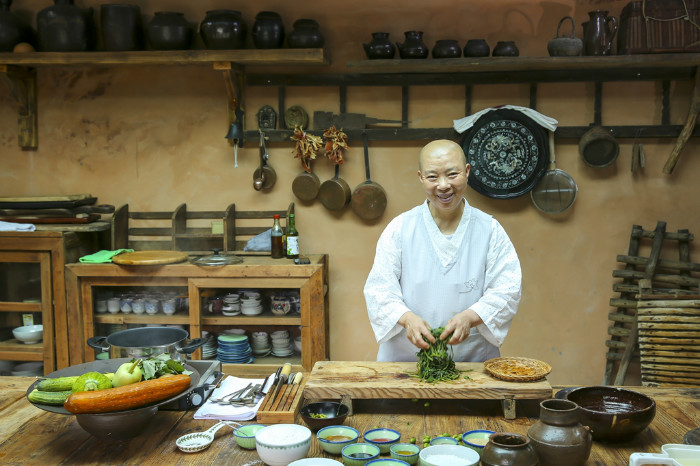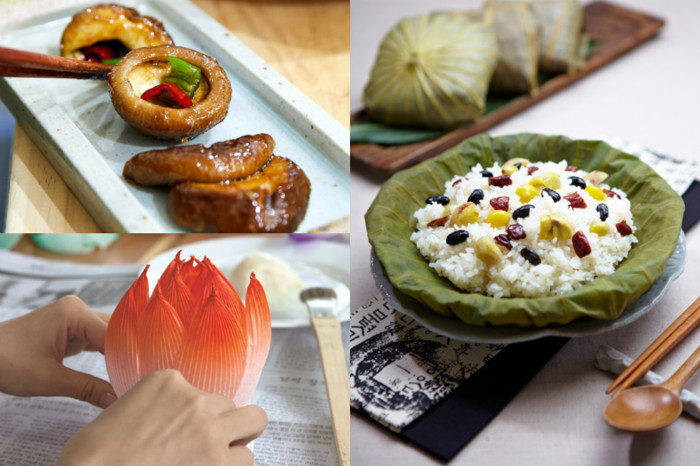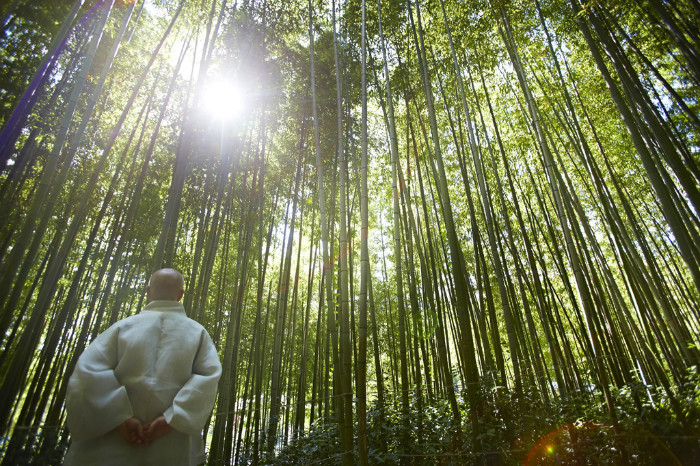'TEMPLE STAY'
Special event
The Buddhist nun Jeong Kwan, protagonist of the third season of Chef's table on Netflix, and the Barugongyang, the typical way of eating in Buddhist temples, will stop in Rome for one of the most interesting events among the events scheduled at the Korean Cultural Institute.

On Wednesday 22nd May from 6.30pm (for about 2 hours, with a contribution of 35 € for living expenses) in the Kitchen Hall of the Korean Cultural Institute it will be possible, for 20 people registered online in advance with a contribution of 35 euros, to participate a special cooking lesson for Buddhist temples conducted by Buddhist nun-chef Jeong Kwan. Furthermore, on the same day from 14 to 18 on the first floor of the Korean Cultural Institute, small craft workshops can be held to make paper lotus flowers (one of the most iconic symbols of Buddhism) and prints of Buddhist inscriptions and symbols ( while stocks last.)

To follow Friday, May 24 from 12.00 at the Grand Hotel Palace in Rome (via Vittorio Veneto 70) will be the turn of the "Barugongyang", the sacred ritual with which we eat with gratitude in Buddhist temples, also scheduled on the third day of Korea Week of Turin: in fact eating is not just eating, but a way of reflecting on the origin of food and being grateful to nature and to the people who prepare the products. The famous Buddhist chef and nun Jeong Kwan, one of the most important exponents of the tradition, will guide us in the experience of this philosophy from which a "Zen" vegetarian cuisine was born. It will be possible to participate for up to 20 people registered online with a contribution of 25 euros.

The Cultural Corps of Korean Buddhism with Ven. Jeong Kwan, protagonist in the third season of the Netflix series "Chef's Table", will guide participants to the experience of Barugongyang, the formal monastic meal in which people get their nourishment from the bowls of wood called "Baru".
Temple food refers to the diet that the monks follow in temples and helps their asceticism based on the abstinence from specific ingredients such as five acid vegetables (garlic, shallots, grass onion, onion and leeks) and meat, to be replaced with natural seasonal ingredients. It is in fact known that dishes based on preserved and fermented foods, which can be consumed over a long period of time, such as kimchi, leave a sense of wisdom and well-being.
Barugongyang is a meditative way of eating with gratitude in Buddhist temples. Take time to consider the origin of food, be grateful for nature and the people who bring us food, and take only the amount that can be consumed. This is an eco-friendly way of eating and at the same time reflects a sense of equity based on a community spirit.
Craft workshop
Place: First floor Korean Cultural Institute (via Nomentana 12)
Timetable: Wednesday, May 22nd from 2:00 pm to 6:00 pm (continued)
* No reservation required
** Until kit runs out
'Temple Food' Cooking Lesson
Recipes: Rice on lotus leaf, shitake mushroom brown in rice syrup, vegetable and tomato Kimchi
Place: Korean Cultural Institute Kitchen Hall (via Nomentana 12)
Hours: Wednesday, May 22, 6.30pm
Number of Max Subscribers: 20 people
* Registration by email to info@culturacorea.it (name, surname, telephone number)
** Registration must be completed with the payment of the contribution of 35 euros at the Institute's reception desk by Wednesday 15 May.
Barugongyang ceremony
Place: Grand Hotel Palace Rome (via Vittorio Veneto 70)
Hours: Friday 24 May from 12.00 to 14.00
Number of Max Subscribers: 20 people
* Registration by email to info@culturacorea.it (name, surname, telephone number)
** Registration must be completed with the payment of the contribution of 25 euros at the Institute reception desk by Wednesday 22 May.
Special event
The Buddhist nun Jeong Kwan, protagonist of the third season of Chef's table on Netflix, and the Barugongyang, the typical way of eating in Buddhist temples, will stop in Rome for one of the most interesting events among the events scheduled at the Korean Cultural Institute.



Temple food refers to the diet that the monks follow in temples and helps their asceticism based on the abstinence from specific ingredients such as five acid vegetables (garlic, shallots, grass onion, onion and leeks) and meat, to be replaced with natural seasonal ingredients. It is in fact known that dishes based on preserved and fermented foods, which can be consumed over a long period of time, such as kimchi, leave a sense of wisdom and well-being.
Barugongyang is a meditative way of eating with gratitude in Buddhist temples. Take time to consider the origin of food, be grateful for nature and the people who bring us food, and take only the amount that can be consumed. This is an eco-friendly way of eating and at the same time reflects a sense of equity based on a community spirit.
Craft workshop
Place: First floor Korean Cultural Institute (via Nomentana 12)
Timetable: Wednesday, May 22nd from 2:00 pm to 6:00 pm (continued)
* No reservation required
** Until kit runs out
'Temple Food' Cooking Lesson
Recipes: Rice on lotus leaf, shitake mushroom brown in rice syrup, vegetable and tomato Kimchi
Place: Korean Cultural Institute Kitchen Hall (via Nomentana 12)
Hours: Wednesday, May 22, 6.30pm
Number of Max Subscribers: 20 people
* Registration by email to info@culturacorea.it (name, surname, telephone number)
** Registration must be completed with the payment of the contribution of 35 euros at the Institute's reception desk by Wednesday 15 May.
Barugongyang ceremony
Place: Grand Hotel Palace Rome (via Vittorio Veneto 70)
Hours: Friday 24 May from 12.00 to 14.00
Number of Max Subscribers: 20 people
* Registration by email to info@culturacorea.it (name, surname, telephone number)
** Registration must be completed with the payment of the contribution of 25 euros at the Institute reception desk by Wednesday 22 May.
Most popular
- 2025 KCC King Sejong Institute Korean Speaking Contest
- KCC visited the earthquake-affected Office of the Auditor General building to provide Korean beverages
- Co-hosted by Kraków’s Waznianova Theater: Koo Jaha's Haribo Kimchi Performance
- 2025 K-Pop Cover Dance Festival In Canada
- Hello Margit! Festival